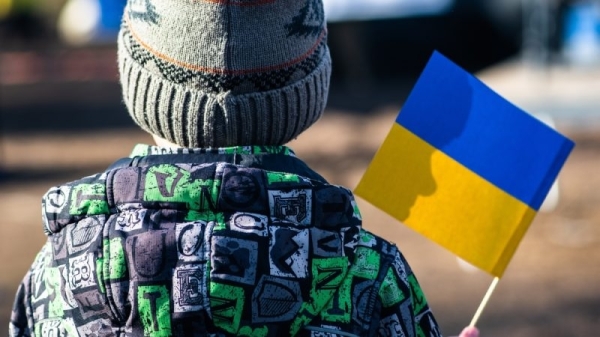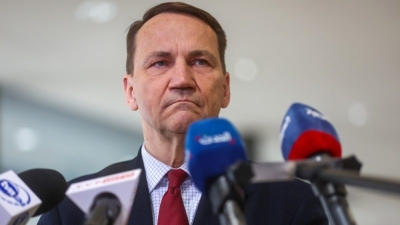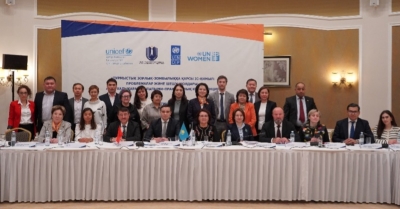Poland looks towards new challenges in Ukraine refugee response

Poland became the primary destination for Ukrainians fleeing Russia’s war on the country, with millions crossing its border. With the fighting entering its second year, needs have shifted beyond humanitarian aid.
The South-Eastern Polish city of Rzeszów, some 75 kilometres from Ukraine’s border, has become the main gateway for Western allies to ship weapons and humanitarian aid, as well as one of the significant transit cities for Ukrainian refugees.
Last year, EURACTIV reported on the ground about the refugee crisis at the Polish-Ukrainian border.
Back then, around 77% of Poles were involved in helping refugees from Ukraine in the early months of the war, spending an estimated €2 billion out of their own pockets, a study by the Polish Economic Institute (PIE) has found.
With the influx of so many people, concerns were raised about social conflicts and other difficulties that could arise as a result of a country that has previously been sceptical about EU asylum and migration policy.
With the war entering its second year and Polish authorities having registered nearly 11 million border crossings, migration flows have reached a stable rhythm.
Although many have since returned to Ukraine or left Poland for other countries, over 1.4 million have registered to stay and are registered for Temporary Protection or under similar national protection schemes.
“The situation in our city is completely different than before the war,” Rzeszów mayor Konrad Fijołek told EURACTIV, one year after we initially met him at the peak of the refugee crisis.
“Our challenge now is to create conditions for integration because they want to find jobs, they want to be financially independent and they want to start a new life here,” he added.
The city of 200,000 currently hosts between 30-40,000 Ukrainian refugees, while at the peak of the crisis it hosted 100,000, an uptick of nearly 50% new inhabitants.
While the integration of Ukrainian refugees into Polish society appears to be proceeding without major problems, challenges remain.
“In Poland, Slovakia and elsewhere across Europe, we have shifted from an emergency response to supporting governments to foster the inclusion of refugees in national systems, with a focus on helping the most vulnerable,” Pascale Moreau, UNHCR Regional Director for Europe, said last month.
“UNHCR is partnering with national and local actors, including ministries, municipal authorities, NGOs and refugee-led organizations, to expand access to education, employment, housing, social welfare and medical or other assistance,” Moreau added.
For many Ukrainian refugees, the Polish language is an important factor. Polish and Ukrainian are similar enough to allow both sides to communicate easily with one another.
“We have about 2,000 children in our schools, whom we have to give Polish lessons and integrate them into the Polish education system,” Fijołek said.
“But our city is full, we don’t have any free places in our schools, we need to establish new schools, new kindergartens, build new, cheaper flats and create job opportunities,” he said.
“We as a city and as a region try to create an integrated system, but for sure we will need money for it – maybe a special government programme for integration or an EU programme for cities and regions hosting refugees,” Fijołek added.
However, asked whether his and the ask of fellow mayors has been heard, Rzeszów’s mayor said “currently there isn’t any perspective for that”.
His comments come as direct financial government support has also been scaled back over the past few months.
Another challenge, less pressing as the war still rages on, is linked to the question of what future Ukrainians see for themselves in the country.
One of the major questions, Polish and Ukrainian officials told EURACTIV on the ground, will be whether Ukrainian citizens-turned-refugees will return to their home country.
“Ukrainians are thinking about a future here and I suppose that most of them will stay here for a long time,” Fijołek said.
Ukraine’s government has been eager to communicate that it wants to create conditions necessary for the return of those who fled to safety, worried about a potentially permanent ‘brain-drain’ from the country.
“Without a question, we are grateful to Poland, and other countries, for hosting our citizens, and as long as the war goes on it’s clear that it is difficult to plan for any future,” one Ukrainian local official told EURACTIV.
“But after the war, depending on how long this will be in the future, some of them might be well-integrated and settled in their host countries and might not be willing to come back,” the official added.
The wider region is also looking forward towards new opportunities in light of stronger cultural ties and cooperation programmes across the border to Ukraine.
“The war makes it faster for the border to disappear and the integration to increase,” Fijołek said.
Asked whether a lesson learned from this refugee crisis could be a change in Poland’s approach to migration in general, the mayor said that “despite the very sad reason, it has been a great opportunity to create a new Polish society, more open, and more experienced in integration processes”.
“We often speak of ourselves as a disorganised society, but during this war, we could show all the world how organised we are, how we can help how and I’m sure that after the war, we can unite and we can be even more supportive,” he added.
More on the same topic...




